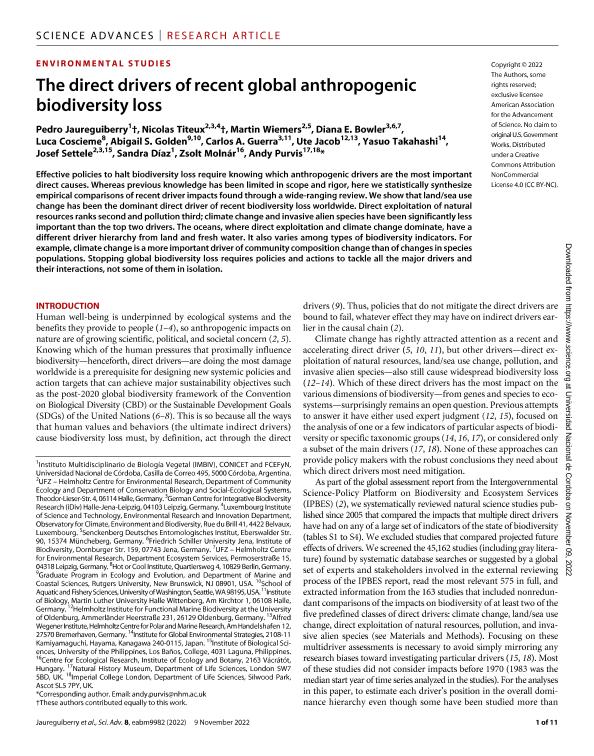Artículo
The direct drivers of recent global anthropogenic biodiversity loss
Jaureguiberry, Pedro ; Titeux, Nicolas; Wiemers, Martin; Bowler, Diana E.; Coscieme, Luca; Golden, Abigail S.; Guerra, Carlos A.; Jacob, Ute; Takahashi, Yasuo; Settele, Josef; Díaz, Sandra Myrna
; Titeux, Nicolas; Wiemers, Martin; Bowler, Diana E.; Coscieme, Luca; Golden, Abigail S.; Guerra, Carlos A.; Jacob, Ute; Takahashi, Yasuo; Settele, Josef; Díaz, Sandra Myrna ; Molnár, Zsolt; Purvis, Andy
; Molnár, Zsolt; Purvis, Andy
 ; Titeux, Nicolas; Wiemers, Martin; Bowler, Diana E.; Coscieme, Luca; Golden, Abigail S.; Guerra, Carlos A.; Jacob, Ute; Takahashi, Yasuo; Settele, Josef; Díaz, Sandra Myrna
; Titeux, Nicolas; Wiemers, Martin; Bowler, Diana E.; Coscieme, Luca; Golden, Abigail S.; Guerra, Carlos A.; Jacob, Ute; Takahashi, Yasuo; Settele, Josef; Díaz, Sandra Myrna ; Molnár, Zsolt; Purvis, Andy
; Molnár, Zsolt; Purvis, Andy
Fecha de publicación:
11/2022
Editorial:
American Association for the Advancement of Science
Revista:
Science Advances
ISSN:
2375-2548
Idioma:
Inglés
Tipo de recurso:
Artículo publicado
Clasificación temática:
Resumen
Effective policies to halt biodiversity loss require knowing which anthropogenic drivers are the most important direct causes. Whereas previous knowledge has been limited in scope and rigor, here we statistically synthesize empirical comparisons of recent driver impacts found through a wide-ranging review. We show that land/sea use change has been the dominant direct driver of recent biodiversity loss worldwide. Direct exploitation of natural resources ranks second and pollution third; climate change and invasive alien species have been significantly less important than the top two drivers. The oceans, where direct exploitation and climate change dominate, have a different driver hierarchy from land and fresh water. It also varies among types of biodiversity indicators. For example, climate change is a more important driver of community composition change than of changes in species populations. Stopping global biodiversity loss requires policies and actions to tackle all the major drivers and their interactions, not some of them in isolation.
Archivos asociados
Licencia
Identificadores
Colecciones
Articulos(IMBIV)
Articulos de INST.MULTIDISCIPL.DE BIOLOGIA VEGETAL (P)
Articulos de INST.MULTIDISCIPL.DE BIOLOGIA VEGETAL (P)
Citación
Jaureguiberry, Pedro; Titeux, Nicolas; Wiemers, Martin; Bowler, Diana E.; Coscieme, Luca; et al.; The direct drivers of recent global anthropogenic biodiversity loss; American Association for the Advancement of Science; Science Advances; 8; 45; 11-2022; 1-12
Compartir
Altmétricas



